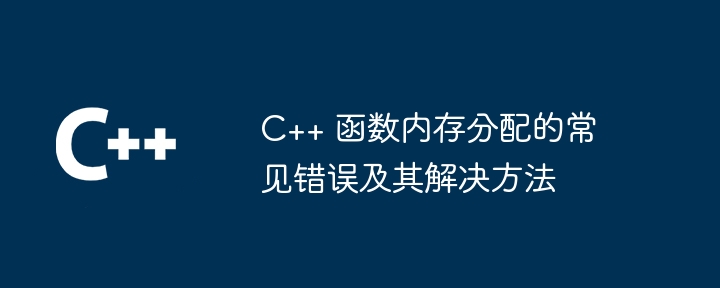Home >Backend Development >C++ >Common errors in C++ function memory allocation and their solutions
Common errors in C++ function memory allocation and their solutions
- WBOYWBOYWBOYWBOYWBOYWBOYWBOYWBOYWBOYWBOYWBOYWBOYWBOriginal
- 2024-04-22 17:09:021016browse
Common errors in function memory allocation include: 1) dangling raw pointers; 2) memory leaks; 3) wild pointers; 4) freeing invalid pointers. Solutions: 1) Use smart pointers; 2) Use RAII; 3) Use memory pools.

Common errors in C function memory allocation and their solutions
Memory management is a crucial aspect of C programming, allocating and releasing memory Errors can cause serious program problems such as memory leaks, segfaults, and program crashes.
Common errors in memory allocation in functions include:
- Dangling Pointers: The pointer still points to a freed memory area.
- Memory Leak: The allocated memory is not released, causing the memory usage to continue to increase.
- Wild Pointers: Pointers point to uninitialized or invalid memory addresses.
- Release invalid pointer (Double Free): The same pointer is released multiple times.
Solution
1. Use smart pointers
A smart pointer is an object that encapsulates a raw pointer and can automatically manage memory Allocate and deallocate, thus avoiding raw pointer dangling and memory leaks.
// 智能指针示例 std::unique_ptr<int> ptr = std::make_unique<int>(42);
2. Use RAII (Resource Acquisition Is Initialization)
RAII is a technology where resources are allocated when created and automatically released when they go out of scope .
// RAII 示例
class Resource {
public:
Resource() { /* 分配资源 */ }
~Resource() { /* 释放资源 */ }
};
int main() {
{
Resource resource; // 资源在创建时分配
} // 资源在超出作用域时自动释放
}3. Using a memory pool
A memory pool is a pre-allocated memory block dedicated to storing specific types of data. Using a memory pool can avoid memory fragmentation and improve memory allocation efficiency.
// 内存池示例
class MemoryPool {
public:
void* allocate(size_t size) { /* 从内存池中分配指定大小的内存 */ }
void deallocate(void* ptr) { /* 释放从内存池分配的内存 */ }
};Practical Case
In the following example, we will show how to use smart pointers and RAII to avoid common memory allocation errors in functions:
class MyClass {
public:
MyClass() {
// 使用智能指针避免裸指针悬垂
ptr = std::make_unique<int>(42);
}
~MyClass() {
// RAII 确保在析构时自动释放内存
}
private:
std::unique_ptr<int> ptr;
};
int main() {
{
MyClass obj; // 资源在创建时分配
} // 资源在超出作用域时自动释放
}By using smart pointers With RAII, we can avoid common memory allocation errors by ensuring that memory is automatically released when it goes out of scope.
The above is the detailed content of Common errors in C++ function memory allocation and their solutions. For more information, please follow other related articles on the PHP Chinese website!

